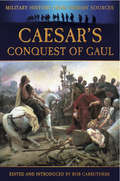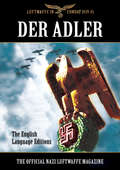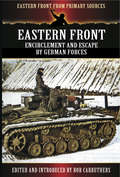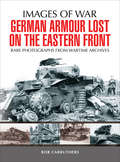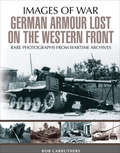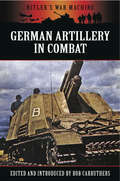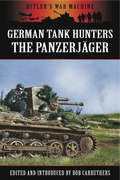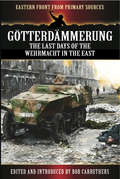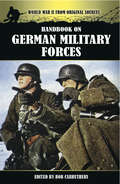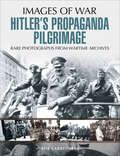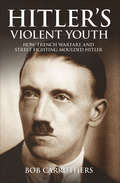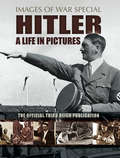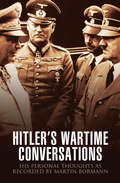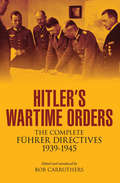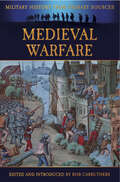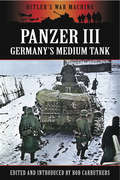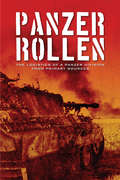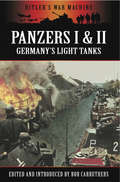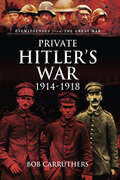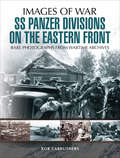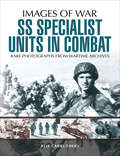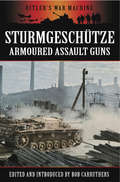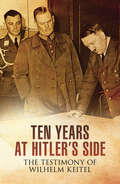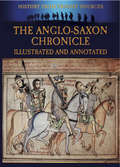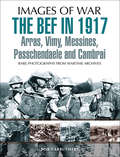- Table View
- List View
Caesar's Conquest of Gaul: The Illustrated Edition (Military History from Primary Sources)
by Bob CarruthersThe Gallic Wars were a series of military campaigns waged by the Roman proconsul Julius Caesar against several Gallic tribes. They lasted from 58 BC to 50 BC and culminated in the decisive Battle of Alesia in 52 BC, in which a complete Roman victory resulted in the expansion of the Roman Republic over the whole of Gaul. The wars paved the way for Julius Caesar to become the sole ruler of the Roman Republic.Although Caesar portrayed this invasion as being a preemptive and defensive action, most historians agree that the wars were fought primarily to boost Caesar's political career and to pay off his massive debts. Still, Gaul was of significant military importance to the Romans, as these had been attacked several times by native tribes both indigenous to Gaul and further to the north. Conquering Gaul allowed Rome to secure the natural border of the river Rhine.The Gallic Wars are described by Julius Caesar as himself in this book, which was originally titled Commentarii de Bello Gallico, it is a pertinent and only slightly tendentious and altogether the most important historical source regarding the conflict. This updated edition contains the translated text and various illustrations depicting Roman warfare and key moments in Caesar's journey.
Der Adler: The Official Nazi Luftwaffe Magazine: The English Language Editions (Luftwaffe in Combat 1939–45)
by Bob CarruthersDer Adler was the official magazine of the Luftwaffe in World War II. In the years before Hitler declared war on America an English language edition of Der Adler costing eight cents was published and widely sold in the USA. The magazine was available on American news stands and the surviving English language editions provide readers who do not speak German with a fascinating primary source from inside the Third Reich. The magazine was at its best and most interesting during the years of German ascendancy between 1940 and 1942. From that point onwards the Luftwaffe had less and less to celebrate and Der Adler tended to concentrate on the exploits of the Luftwaffe ground forces especially the burgeoning Falshirmjaeger divisions. This selection of the best of the English language articles from Der Adler provides a privileged glimpse inside the Luftwaffe during its years of triumph between 1940 and 1942.
Eastern Front: Encirclement and Escape by German Forces (Eastern Front From Primary Sources)
by Bob CarruthersThe ferocious battles for survival fought by trapped German forces in Russia have become synonymous with that most terrible of all military campaigns. shortly after the war the personal experiences of those who had fought in the battles were collected together as the German report series. These reports include invaluable information from impeccable sources on the pockets formed at Klin, Velikiye Luki, Cherkassy and Kamenets-Podolskiy.Also included are contemporary reports featuring German encirclement tactics, and an in-depth feature on the Kiev operation. This new compilation is essential reading for anyone interested in discovering the real experience of the German forces trapped in Russia.This book is part of the 'Hitler's War Machine' series, a new military history range compiled and edited by Emmy Award winning author and historian Bob Carruthers. The series draws on primary sources and contemporary documents to provide a new insight into the true nature of Hitler's Wehrmacht.The series consultant is David Mcwhinnie creator of the award winning PBS series 'Battlefield'.
German Armour Lost on the Eastern Front: Rare Photographs From Wartime Archives (Images of War)
by Bob CarruthersRare photographs from both German and Russian sources : Today there are very few surviving vehicles from the Wehrmacht. which illustrate the fate of many of the armored fighting vehicles of Hitlers much vaunted Panzerwaffe-
German Armour Lost on the Western Front: Rare Photographs From Wartime Archives (Images of War)
by Bob CarruthersAn illustrated history of Nazi German armoured vehicles destroyed in action along the Western Front during World War II.The German armoured forces lost some 10,000 armoured fighting vehicles. Today there are very few surviving vehicles from the Wehrmacht. We are fortunate therefore that these unique photographs detail the fate of the Panzers destroyed in action in the west.Praise for German Armour Lost on the Western Front“A marvellous collection of over 200 photographs of German armoured vehicles knocked out from 1944 onwards, from the Normandy beaches and Italy to the borders of the Reich. Almost all of the vehicles featured are those built around the Panzer III to VI chassis, including self-propelled guns and many specific variants of tanks. . . . With this broad array of vehicles and situations, this book will certainly be an invaluable guide to the modeller, but it also serves as a reminder of the devastating impact of armour piercing weapons, and the vulnerability of tank crews in their seemingly impervious machines.” —Pegasus Archive, Mark Hickman“An excellent pictograph reference book covering German losses during the Second World War. The pictures are clear and the supporting text provided, factual. I highly recommend this book to any historical buffs or modeling fans who are interested in wrecked and abandoned vehicles.” —MSC Review Connect, Todd Michalak
German Artillery in Combat (Hitler's War Machine)
by Bob CarruthersThis unique collection of contemporary combat accounts provides a primary source insight into the reality of artillery operations on the Eastern Front. Mobile, rail and towed artillery are all considered in this fascinating compilation. This book is part of the 'Hitler's War Machine' series, a new military history range compiled and edited by Emmy Award winning author and historian Bob Carruthers. The series draws on primary sources and contemporary documents to provide a new insight into the true nature of Hitler's Wehrmacht.The series consultant is David Mcwhinnie creator of the award winning PBS series 'Battlefield'
German Tank Hunters: The Panzerjäger (Hitler's War Machine)
by Bob CarruthersThis unique collection of contemporary combat accounts provides a primary source insight into the reality of anti-tank warfare on the Eastern Front. Both armoured and infantry based operations are considered.This book is part of the 'Hitler's War Machine' series, a new military history range compiled and edited by Emmy Award winning author and historian Bob Carruthers. The series draws on primary sources and contemporary documents to provide a new insight into the true nature of Hitler's Wehrmacht.The series consultant is David Mcwhinnie creator of the award winning PBS series 'Battlefield'.
Götterdämmerung: The Last Days of the Wehrmacht in the East (Eastern Front From Primary Sources Ser.)
by Bob CarruthersThis fascinating collection of primary source accounts focuses on the combat actions of the Wehrmacht in the final battles of the war. The material is drawn from a variety of wartime sources and encompasses fascinating writings concerning the tactical, operational and strategic aspects of the battle for Berlin. Compiled and edited by Emmy Award winning author and historian Bob Carruthers, this absorbing assembly of primary source intelligence reports encompasses rare material originally drawn from both German and Russian original sources to provide the reader with a unique insight into the last battles in the east. This is the unvarnished reality of what it meant to fight in this titanic struggle to the death.Featured in the book are reports concerning little known and neglected tactical aspects of the war including weapons, street fighting techniques and improvised anti-tank measures. Original illustrations from US wartime intelligence manuals are also featured. This compelling compilation is essential for readers with an interest in discovering more about the last days of the Wehrmacht from a range of unusual and diverse primary sources.
Handbook on German Military Forces: Handbook On German Military Forces (World War II From Original Sources)
by Bob CarruthersThe Handbook On German Military Forces is an indispensable primary reference source for historians and enthusiasts. In 1945 the Allies were still engaged in bitter fighting against stiff resistance from the German armies in the west. The US War Department was determined to do its best to equip the US forces fighting the Germans in the field with as much knowledge as possible. March 1945 saw the issue of an astonishing document entitled the Handbook On German Military Forces. This was a truly remarkable work of intelligence gathering which formed a vast compendium of all the relevant knowledge amassed on the German Wehrmacht.Amazingly accurate and comprehensive, the Handbook ran to over six hundred pages and was designed to equip commanders in the field with everything they were likely to need to know about the German forces. The Handbook remained classified until 1953 and then slipped into obscurity.This new paperback reprint rescues this great work from obscurity, covering the psychology, organisation, tactics and operational aspects of the German forces. The weapons, machines, aircraft and uniforms of the German forces are also documented within the Handbook.The Handbook On German Military Forces is a fascinating primary reference source for historians and enthusiasts alike, providing an invaluable insight into the detail of the German Army which is still an unrivaled source of information today.
Hitler's Propaganda Pilgrimage (Images of War)
by Bob CarruthersThe famous image of Hitler in Paris has become one of the most iconic images of the Second World War. However, Hitler only spent a few hours in Paris before heading to Flanders to re-visit the sites of the battlefields where he had served during the Great War. He was on a propaganda mission to publicize his own war service and a full photographic record of Hitler's visits to France and Flanders was produced by Heinrich Hoffman, Hitler's personal photographer. Those photographs from 1940 have now been collected together for the first time and are reproduced here along with all of the most important surviving images of Hitler in the Great War.Featuring rare and previously unpublished images of Hitler in France and Flanders from 1914 to 1940, this important photographic study documents a vital but often overlooked chapter in the story of Adolf Hitler.
Hitler's Violent Youth: How Trench Warfare and Street Fighting Moulded Hitler
by Bob CarruthersAn Emmy Award–winning author and historian delves into the brutal early life of the man who would become Nazi Germany&’s maniacal dictator. Between 1889 and 1924, Adolph Hitler&’s political outlook was borne out of vicious incidents that heralded the formation of the Sturmabteilung—the notorious SA. Drawing extensively on Hitler&’s own biographical account in Mein Kampf, Bob Carruthers illustrates how these events influenced the future führer&’s worldview and led directly to the Beer Hall Putsch of 1923. Hitler&’s difficult relationship with his cruel father, his harsh experiences in Vienna, and his involvement in the Great War all conditioned him to celebrate violent acts. By Hitler&’s own account, his complete disregard for the consequences of his actions was vindicated by his victories in fierce encounters including beer hall brawls and street battles. Each successive triumph over adversity influenced his decision-making process, imbuing him with a love of violence and culminating in the ill-fated events of November 1924, which saw Hitler imprisoned for the second time. Carruthers also explores the parallel growth of the SA from a small group of fist fighters to a feared paramilitary force along with a comprehensive survey of the violent events between 1920 and 1924, which shaped this infamous political instrument of terror alongside the man who instigated World War II.
Hitler: The Official Third Reich Publication (Images of War Special)
by Bob CarruthersThis exceptional source is probably the best of the contemporary accounts of Hitler in power, albeit from a heavily pro-Nazi stance. The testimonies collected together were based on interviews conducted by Heinz A. Heinz in 1933 and 1934, shortly after Hitler had taken power.Millions of ordinary Germans fell under Hitler's spell and this book is a creation of those emotions. It is very much a product of its time. Written by the party big-wigs, such as Goering, Speer and Goebbels, and published in 1935 under the title Adolf Hitler Bilder Aus Dem Leben Des Furhers, it appeared at a time when they were at the height of their unrivaled powers. This fascinating volume encompasses the superb photography of Heinrich Hoffman, the Munich photographer who was ever present on Hitler's journeys and who grew fabulously wealthy as a result of his intimate access to Hitler. Hitler had an innate understanding of what we would now call public relations. He recognised the excellence of Hoffman's photography and maintained control of his image by limiting the access of other photographers. He also strictly controlled Hoffmann's activities and personally selected the portraits that were allowed to go into circulation.The book incorporates sections on Hitler and the German people, Hitler and the German workers, Hitler and public works and so on, all accompanied by a series of excellent photographs which form a remarkable record of the public face of a man during his brief spell of absolute power. The Nazis were the first party who harnessed the full power of the media in a coherent and all-embracing manner.This is a classic example of the strength of their presentation skills. It is a compelling time-capsule which conveys vividly in almost visceral way the zeitgeist of the thirties in Nazi-Germany. By 1935 the bulk of the German people had fallen in behind Adolf Hitler, and with documents as persuasive as this, it is not too difficult to comprehend the allure of the glittering faade which a stream of publications such as this book sought to create and maintain.
Hitler’s Wartime Conversations: His Personal Thoughts as Recorded by Martin Bormann
by Bob CarruthersAfter dinner at the Wolfs Lair it was Hitlers custom to retire to his private quarters where Hitler and his entourage often listened to gramophone records of Beethoven symphonies, selections from Wagner while Hitler would hold forth with lengthy and rambling monologues touching on a wide variety of subjects. Hitler was invariably joined by Keitel and his two secretaries, also present was Martin Bormann who decided to commission a recording of Hitlers words for posterity.
Hitler’s Wartime Orders: The Complete Führer Directives, 1939–1945
by Bob CarruthersPresented here, in one collection, is the important historical record of Hitler’s war directives. From preparations for the invasion of Poland to his last desperate order to his troops on the Eastern Front, this unbroken edition provides a fascinating insight in to the proceedings of the Second World War and the mind of the man that launched the world into chaos. From initial optimism in 1939, to the disarray of later orders, it is fascinating to see how the events of the war were received and processed by the upper echelons of the Third Reich and how these reactions shaped future military policy. This unvarnished publication reveals the true nature of Adolf Hitler as a military commander and sheds light on the events of one of the world’s greatest tragedies. All the wartime orders has been typeset in a clear presentation format and presented chronologically.
Medieval Warfare: Medieval Warfare (Military History from Primary Sources)
by Bob CarruthersJames Grant (1822–1887) was a Scottish author and was born in Edinburgh, Scotland, and was a distant relation of Sir WalterScott. He was a prolific author, writing some 90 books, including many yellow-backs. Titles included Adventures of an Aide-decamp, One of 'The Six Hundred', The Scottish Musketeers and The Scottish Cavalier.Medieval Warfare collects Grant's work on the subject, from the Battle of Hastings in 1066 to the Battle of Barnet in 1471, a decisive engagement in the Wars of the Roses. The book contains remarkably detailed accounts of many key battles from the period including the Battle of the Standard and Bannockburn to Poitiers and Agincourt from the Hundred Years' War. The historically defining strategies employed during these battles are explored throughout.Illustrated with vivid portraits of battle and detailed drawings of the tools and weapons of the period, this is the definitive account of a trying and bloody period in history.
Panzer III: Germany's Medium Tank (Hitler's War Machine)
by Bob CarruthersThe Panzer III was designed to be the backbone of the Panzer force and was deployed on every front. However, due to its deficient armament and poor armour, and despite its outstanding reliability, it was obsolete by 1942.This comprehensive overview of the Panzer III in action was compiled by Emmy Award winning historian Bob Carruthers. It draws heavily on war-time intelligence reports to produce a fascinating insight into the development and combat history of the Panzer III at the tactical and operational level.Also featured are rare developments such as the flame thrower variant alongside unpublished photographs and illustrations which provide an absorbing study, from an array of primary sources, of the world of the Panzer III and its crews, which conveys to the modern reader a vivid sense of how they were viewed at the time.
Panzer Rollen: The Logistics of a Panzer Division From Primary Sources
by Bob CarruthersPanzer Rollen provides an insightful look in to the workings of the Military Intelligence Service that was so invaluable in shaping both the strategy and tactics of the Allied forces during the Second World War.
Panzers I & II: Germany's Light Tanks (Hitler's War Machine)
by Bob CarruthersThe first vehicle to be produced in any numbers for the Panzerwaffe was the tiny Panzer I known as the MG Panzerwagen. Almost from the outset the limitations of the design for the Panzer I were obvious. It was essentially a training vehicle which was only pressed into service as a last resort. It was to be succeeded by the Panzer II which could at least engage armoured cars and combat against tanks with approximately the same armour as itself.Together these two tanks formed the bulk of the armour which between 1939 and 1941 conquered half of Europe.This comprehensive overview of the light Panzers in action was compiled by Emmy Award winning historian Bob Carruthers. It draws heavily on war-time intelligence reports to produce a fascinating insight into the development and combat history of the light Panzers at the tactical and operational level.Also featured are rare developments such as the Panzer II flame thrower variant alongside unpublished photographs and illustrations which provide an absorbing study, from an array of primary sources, of the world of the light Panzer and their crews from contemporary Allied sources.
Private Hitler's War, 1914–1918: 1914-1919 (Eyewitnesses from The Great War)
by Bob CarruthersDuring the Great War Adolf Hitler served in the ranks of the 16th Bavarian Reserve Infantry Regiment from 1914 to 1918, and was awarded the Iron Cross. In later years, under the masterful control of Doctor Goebbels, Hitler was successfully portrayed by the Nazis as a valiant front-line soldier who, for four long years, had fought many hard battles in the front-line of trenches.The world has long accepted the Nazi version, and Hitler is often referred to as a Corporal, but a series of clues remained which pointed to an alternative version of the truth. Even at the zenith of his power, Hitler was always mindful that there were those who maintained that, far from being a brave front-line fighter, he was actually a fraud; a draft-dodger and rear area malingerer who in four years of war had only ever fought in one action.Hitler knew the uncomfortable truth. The Nazi machine acted ruthlessly and former colleagues such as Hans Mend, who didn't toe the party line, soon ended up in concentration camps.Now, almost a century later, as a result of a series of painstaking investigations, the producers of the ground-breaking documentary Private Hitler's War have resolved the century long controversy over Hitler's service in the Great War. This powerful documentary tie-in book finally turns the Nazi myth on its head and reveals the full unvarnished truth concerning Adolf Hitler's actions in the Great War.
SS Panzer Divisions on the Eastern Front: Rare Photographs From Wartime Archives (Images of War)
by Bob Carruthers“This book is chock full of striking photographs taken throughout the war, from the invasion of Poland, to the last battles in Hungary . . . a treasure.” —Western Slope Division This book follows the path of the 1st SS Panzer Division “Leibstandarte SS Adolf Hitler,” 2nd SS Panzer Division “Das Reich,” 3rd SS Panzer Division “Totenkopf,” and 5th SS Panzer Division “Wiking” from the opening stages of the war and the challenges of Barbarossa, through to the long and bloody retreat to Berlin. This exceptional collection of images captures the titanic struggle endured by these divisions, and the chain of events they set in motion that proved so critical in shaping the face of the Second World War.Featuring rare images, this is the definitive record of SS Panzer Divisions on the Eastern Front, and an essential addition to any enthusiast’s collection.
SS Specialist Units in Combat (Images of War)
by Bob CarruthersIt is an often overlooked fact that the SS Divisions included Cavalrymen, Paratroopers, Mountain and Ski Battalions and these rare photographs illustrate the unique role played by specialist units in action.
Sturmgeschütze: Armoured Assault Guns (Hitler's War Machine)
by Bob CarruthersAn overview of the Wehrmacht&’s little-known mobile assault guns designed to provide close infantry support against enemy field defenses in World War II. The Stürmgeschutze rumbling forward into action is one of the iconic images of World War II. As mobile assault guns, the StuGs were essentially designed as infantry support weapons, but they also proved themselves as highly effective tank destroyers. Written by Emmy Award-winning author Bob Carruthers this fascinating study encompasses the design, development and combat history of the StuG II and IV. Drawing on a variety of rare primary sources and photographs this outstanding study explains the role of the StuG in context and examines the combat records of the StuG aces such as Franz von Malachowski, and Knight&’s Cross holder Oberwachtmeister Hugo Primozic of Stug.Abt.667. Indispensable reading for anyone with an interest in armored warfare, this book is part of the Hitler&’s War Machine series, a new military history range compiled and edited by Emmy Award winning-author and historian Bob Carruthers. The series draws on primary sources and contemporary documents to provide a new insight into the true nature of Hitler&’s Wehrmacht.
Ten Years at Hitler's Side: The Testimony of Wilhelm Keitel
by Bob CarruthersIn October 1946, Wilhelm Keitel was executed by hanging after being sentenced to death at the Nuremburg Trials. His road to this point was a long and controversial one, from the heady days of the surrender of France, to the eventual fall of Berlin and his subsequent arrest. There were few men better positioned to provide insight in to the minds and workings of the National Socialist Party, and of those a preciously limited amount were held accountable for their crimes. This renders the record of Keitels trial as published here an invaluable historical record that goes some way to providing an understanding of the near incomprehensible crimes committed during the Third Reich.Edited and introduced by esteemed historian Bob Carruthers, this unadulterated record of Wilhelm Keitels trial at Nuremburg is essential reading for all history enthusiasts and an important account of events that truly shook the world.
The Anglo-Saxon Chronicle: Illustrated and Annotated (History From Primary Sources Ser.)
by Bob CarruthersThe essential primary-source history of the British Isles through the early Middle Ages, fully annotated and illustrated with paintings and engravings. The Anglo-Saxon Chronicle is one of the most important sets of historical documents concerning the history of the British Isles. These vital accounts, thought to be first set down in the late ninth century by a scribe in Wessex, illuminate events through the Dark Ages that would otherwise be lost to history. Without this chronicle, it would be impossible to write the history of the English from the Romans to the Norman Conquest. The compilers of this chronicle included contemporary events they themselves witnessed, as well as those recorded by earlier annalists whose work is in many cases preserved nowhere else. With nine known versions of the Chronicle in existence, this translated edition presents a conflation of passages from different versions. Relying heavily on Rev. James Ingram&’s 1828 translation, the footnotes provided are all those of Rev. Ingram. This edition also includes the complete Parker Manuscript.
The BEF in 1917: Arras, Vimy, Messines, Passchendaele and Cambrai (Images of War)
by Bob CarruthersThis new volume in the long-running Images of War series features the actions of the British Army at Passchendaele. The book is comprised of rare photographs illustrating the years of fighting on the northern sector of the Ypres salient, which finally culminated in the capture of the ridge at Passchendaele, accompanied by a powerful text written by Official War Correspondent Philip Gibbs, who was an eyewitness to the events. Photographs from the battlefield illustrate the terrible conditions, which the British forces on the battlefield endured in the notorious engagement, which has become synonymous with mud and squalor.This book incorporates a wide range of images, encompassing the actions of the British infantry and their supporting artillery. Also featured are images which depict the almost incomprehensible state of the waterlogged trenches. Portraits of the British troops are contrasted with German prisoners of war and the endless battle to get the supply columns through to the front.
